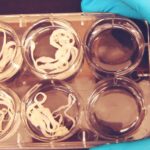What are iodine supplements used for?
Iodine is a micronutrient necessary for the production of thyroid hormones. Iodine in food can be mainly found in fish, shellfish, eggs, dairy products, and iodized table salt. Some seaweeds used in Japanese cooking contain especially large quantities of this micronutrient. The recommended daily iodine intake in adults is 150 μg. During pregnancy and breastfeeding, larger amounts of 200–250 μg iodine are required daily for both the mother and the growing fetus. In children, the requirement is 90 – 120 μg.
A deficiency of iodine occurs due to the lack of iodine in the diet or due to the intake of goitrogens in food. Goitrogens are substances that suppress the iodine uptake by the thyroid gland, resulting in goiter. They are commonly present in vegetables of the brassica family (cabbage, kale, and rape) which contain thiocyanate. Some of the other foods containing goitrogens are soybeans, peanuts, millet, strawberries, spinach, and sweet potatoes.
Effects of deficiency in adults
A deficiency of iodine can result in excessive stimulation of the thyroid to produce more hormones which cause goiter (an enlargement of the thyroid gland located in the front of the neck). Thyroid-stimulating hormone (TSH) is released from the pituitary gland which stimulates the thyroid gland, resulting in a large swelling of the neck.
Iodine deficiency leads to endemic goiter which is defined as its occurrence in more than 10% of the population in a certain geographic area. A huge goiter can cause pressure symptoms due to deviation of the trachea (respiratory passage). In longstanding cases, the goiter may develop malignancy (cancerous growth).
Effects of deficiency in the fetus and newborn babies
A lack of iodine has the most serious effects on the growing fetus because the development of the central nervous system (brain and spinal cord) is affected, resulting in mental retardation. The central nervous system is most sensitive to the lack of iodine during the first trimester of pregnancy. An adequate supply of iodine is though essential throughout the fetal growth and later in the newborn child for proper brain development. Even a small amount of iodine deficiency may result in lower IQ (Intelligence Quotient) in a child. It may also result in gait abnormality, hearing and speech defects.
Prevention of iodine deficiency
As per the WHO study, the lowest prevalence of iodine deficiency occurs in the United States due to the consumption of iodized salt. The highest prevalence exists in the European region, as published in the WHO bulletin.
Provision of adequate amounts of iodine in a diet and avoiding goitrogenic food consumption in large quantities are the means used to prevent endemic goiter. Iodization of salt is the best method of prevention because it is consumed globally by every human being. The technology for the iodization of salt is well-developed and simple. In this method, Potassium iodide is added to the common salt (Sodium chloride) in amounts ranging from 1 in 10000 to 200000 of salt, depending on local salt consumption. Iodization of vegetable oil is also practiced, especially in the areas where salt consumption is not common for reasons like geographical barriers or eating habits. In areas with severe iodine deficiency, depot injections or capsules of iodized oil can be given at 6–18 month intervals. In adults, thyroxine (tablets of thyroid hormone) therapy may be required along with iodine supplementation, which may result in the reduction of goiter’s size.
Iodine is an important micronutrient having a significant impact on our health, both during fetal growth and adult life. Its requirement increases further during puberty, pregnancy, and lactation. The complications of its deficiency in children are preventable but once established, they are difficult to treat. During these periods of increased demand for iodine, a medical consult should be taken. Additionally, iodized salt should always be used during cooking to prevent deficiency.




























